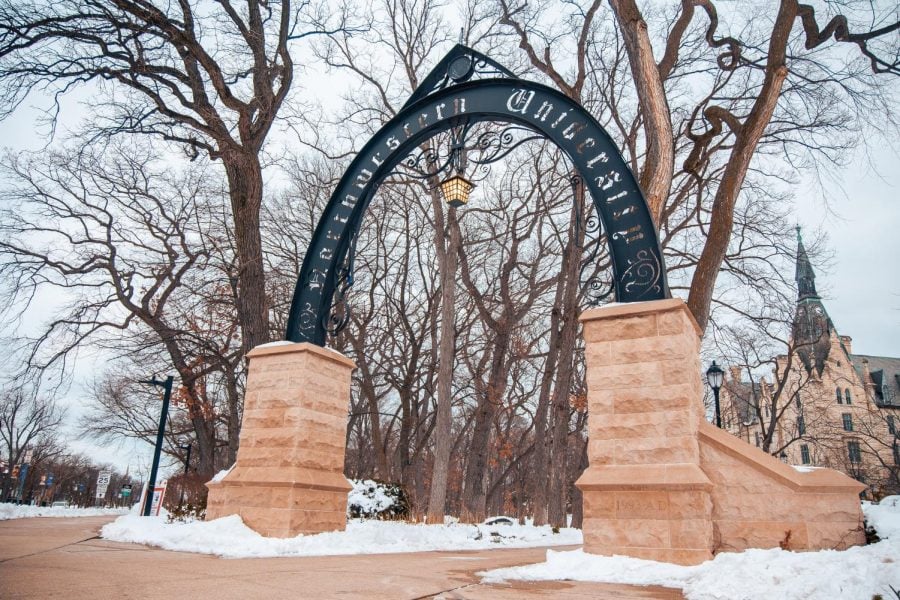Evanston residents share thoughts on Northwestern’s Good Neighbor Racial Equity Fund
Daily file photo by Kelsey Carroll
The Weber Arch. Northwestern announced the Good Neighbor Racial Equity Fund in July 2020.
August 23, 2021
In July 2020, then-Evanston Mayor Steve Hagerty and Northwestern President Morton Schapiro announced a new plan for the University to give back to the community and advance racial equity in Evanston: the Good Neighbor Racial Equity Fund.
Through the fund, NU has committed $1 million for fiscal year 2020-21 to support projects to improve racial equity in the community. The fund focuses on four areas: justice and government, neighborhoods and infrastructure, economic opportunity and public health.
“As Northwestern’s Evanston and Chicago homes grapple with two historic challenges — COVID-19 and systemic racism — the University is in a position to help lead the way in finding a solution, and it has a duty to do so,” Schapiro said when announcing the program. “As part of our efforts to strengthen our communities, we are increasing our commitments in Evanston and Chicago.”
The recipient programs for the $1 million were announced in March. The funds were allocated to projects mutually agreed upon by the University and the city. $400,000 is going to support minority-owned businesses, $300,000 is allocated for monthly cash payments to low-income Evanston households and $100,000 is going toward consulting services to increase the equitability of city services.
$50,000 will be used to mobilize local artists and cultural organizations “to improve the quality of life and amplify voices in underserved communities,” and another $50,000 will go to help the city fill language accessibility gaps through staff training and translation of documents.
A further $50,000 will go toward the launch of a program that uses in-home technology to reduce isolation for older adults, and the city’s fund for residents who can’t get government assistance because of their immigration status will also receive $50,000.
“Advancing racial equity and eliminating the social and economic disparities that have been present in our city for decades require a community-wide commitment,” Hagerty said when the fund was announced. “The Good Neighbor Racial Equity Fund will allow Evanston to build on our efforts to eradicate systemic racism, remove barriers for marginalized communities, and further invest in programs that uplift our entire city.”
In addition to the $1 million fund, Northwestern has created a $500,000 Racial Equity and Community Partnership grants program, which was developed by an advisory committee of University faculty and staff alongside local community leaders. The program gives grants to projects that “seek to solve the systemic problems of racial inequity in local neighborhoods.”
An anonymous donor provided another $100,000 to the grants program for each of the next five years.
In June, NU announced the 21 selected grant applicants, which consist of both community groups in Evanston and Chicago and partnerships between community-based groups and NU students, staff and faculty. The chosen projects include trauma-informed care for early childhood programs, researching COVID-19’s impact on Black and Latina transgender women and mentoring inner-city students on financial literacy.
The Daily spoke with several Evanston residents about their opinions on the Good Neighbor Racial Equity Fund. Many were pleased with the financial support it will bring, though there were some criticisms.
“It’s about damn time,” resident Denise Barreto said of NU’s decision to give money toward racial equity.
Barreto, a board member of the local artists’ organization Evanston Made, said she was thankful the fund recognizes and financially supports the arts, which she said are an important part of the fight for racial justice.
“We all know that artists got us through the pandemic,” Barreto said. “I 100 percent believe that artists are people who pursue their art and pursue justice through art. It’s a form of resistance to capitalism. It’s a form of resistance to these systems that have been trying to crush us.”
However, Barreto took issue with the fund’s use of the term ‘underserved.’ She said more accurate language would be ‘historically excluded,’ as words like ‘underserved’ are an attempt to deflect blame for inequities.
City Clerk Stephanie Mendoza said the portion of the fund going toward translating official documents into Spanish and other languages is important because language can be a barrier to accessing information.
However, she said translating city documents should always be done as a matter of policy.
“It’s a step in the right direction,” Mendoza said. “The only thing that worries me about the fund is, is there a plan moving forward after these particular funds run out? Is there a plan moving forward to make sure that there’s always money available for these services?”
Larry Murphy, co-owner of YoFresh Yogurt Cafe, a local Black-owned business, said the fund’s support of Black business owners is essential in shifting the city’s socioeconomic profile.
By uplifting Black businesses, Murphy said, the city’s Black residents are offered a better chance at financial equity.
“The legacy of the past has been social and economic discrimination and inequity,” Murphy said. “This is not a matter of giving favoritism or privileging, but assisting to bring into balance to make up for the deficit in the past that discrimination and segregatory practices have created.”
In general, some residents feel the University could be doing more to give back to the community, especially given NU’s status as a tax-exempt institution.
Evanston resident Dino Robinson criticized the amount of money given in the fund. He said the University could spare more than just a million dollars to give back to the community.
“If Northwestern really looks at a larger picture of what is tremendously needed in the city of Evanston,” Robinson said, “I think they’ll realize that a million dollars is not enough.”
Email: [email protected]
Twitter: @cvanwaasbergen
Related Stories:
— Northwestern updates community on fulfilling commitments to racial and social justice
— Hagerty and Schapiro announce Northwestern Good Neighbor Equity Fund recipient programs
— Northwestern announces Racial Equity and Community Partnership grant recipients


